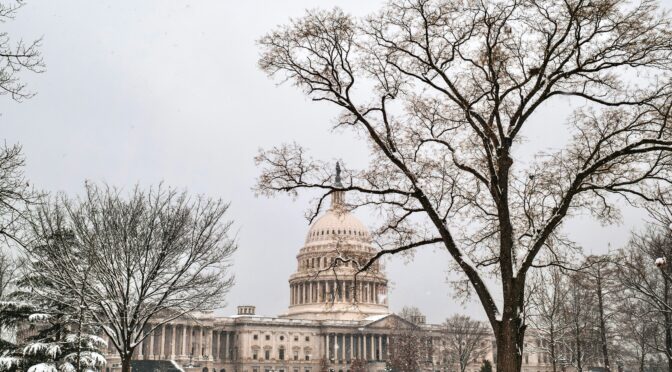By Sean Robins, NACAC’s director of advocacy
Welcome to this issue of the Advocacy Update on NACAC’s Admitted blog. This moment demands sustained, coordinated advocacy. Across Congress, the courts, and federal agencies, decisions are being made — often quickly and with limited transparency — that will shape college access, affordability, and institutional autonomy for years to come. Funding negotiations, administrative restructuring, and legal challenges are converging in ways that directly affect students, counselors, and institutions navigating an already volatile landscape. In this environment, advocacy is not optional or abstract. It can be as simple — and as powerful — as taking a few minutes to complete an action alert and speak up for the programs, protections, and students that matter most.
Policy & Legislative Updates
Congress is navigating a narrow and volatile endgame for FY 2026 appropriations, with education funding at the center of high-stakes negotiations. The House has already passed a bipartisan six-bill minibus that includes Labor-HHS-Education and largely rejects the administration’s most aggressive proposed cuts to education and student-support programs. That same package stalled in the Senate earlier this week after failing a procedural vote, bringing the government to the brink of a shutdown. Late last night, Senate Democrats and the White House reached an agreement to move the bill forward by advancing five of the six appropriations bills — including Labor-HHS-Education — while relying on a two-week continuing resolution for the Department of Homeland Security to allow additional negotiations over immigration enforcement reforms. The Senate is expected to vote on that agreement today. Even if the package advances, a brief shutdown now appears likely, as the House will not return to session until next week and must vote again before funding can be finalized. Decisions made in the coming days will shape funding stability, program continuity, and congressional oversight for the year ahead, making this a critical moment for sustained advocacy.
At the same time, broader efforts to reshape the federal role in education are accelerating. The Department of Education has announced that higher education staff will be detailed to the Department of Labor as interagency agreements move forward, shifting the administration of several postsecondary and workforce-related programs. Affected grantees will transition to Labor’s grants and payment systems in the coming weeks. While the administration frames these changes as integration and efficiency, they raise serious concerns about the erosion of statutory responsibility, loss of institutional expertise, and weakened accountability within federal education programs — especially as Congress signals clear intent to keep these functions within the Education Department, even if it stops short of fully blocking the transfers.
Recent events have also underscored how federal volatility is disrupting institutions’ ability to plan and serve students. The abrupt cancellation by the Trump administration — and equally abrupt reinstatement — of up to $2 billion in student mental health and addiction treatment grants left schools and states in limbo, highlighting the real-world consequences of uncoordinated federal action. A new survey of college leaders reinforces this picture, with nearly all respondents reporting heightened uncertainty tied to federal policy shifts affecting student aid, research funding, immigration, and academic freedom. Together, these pressures are straining long-term planning and undermining confidence across higher education.
Against this backdrop, several important legal developments offer both guardrails and caution. A federal court has ordered the Education Department to reconsider canceled TRIO grants, finding that the department failed to follow required statutory and regulatory processes and improperly applied new policy priorities retroactively. The ruling is a significant rebuke and an important step toward restoring transparency and stability for programs serving tens of thousands of students. Separately, the administration has dropped its appeal of a federal court decision blocking its attempt to threaten institutions over lawful diversity, equity, and inclusion activities, leaving in place a ruling that affirms First Amendment protections and limits executive overreach. Courts have also intervened after newly unsealed records revealed that international students and scholars were targeted for deportation based on protected speech, raising profound concerns about academic freedom and civil liberties.
Other policy shifts remain mixed. The administration announced a suspension of wage garnishment and tax refund seizures for borrowers in default on federal student loans, offering short-term relief to millions, though interest accrual and credit reporting will continue and long-term repayment clarity remains unresolved. Meanwhile, states including Texas and Florida have moved to pause H-1B visa hiring at public universities, compounding new federal fees and threatening institutions’ ability to recruit international faculty and sustain research capacity.
As federal pressure on higher education continues to intensify, new responses are emerging. A national Alliance for Higher Education has launched to push back against political interference and defend academic freedom and institutional autonomy. Institutions are also navigating new accessibility obligations as updated Title II regulations take effect this spring, reinforcing that digital access is now central to college access and student success. At the institutional level, some colleges are expanding affordability in meaningful ways, including Yale’s decision to extend free tuition to families earning up to $200,000 — a reminder that access-focused policy choices remain possible even amid uncertainty.
NACAC Advocacy
Since the last issue, NACAC has continued to engage aggressively at the federal level to protect college access, affordability, and institutional autonomy during a period of heightened uncertainty. Most notably, NACAC publicly supported a bipartisan congressional minibus funding package that includes the Labor-HHS-Education bill and rejects the administration’s most harmful proposed cuts to education. The legislation preserves Pell Grants, TRIO, GEAR UP, campus-based aid, and support for Minority-Serving Institutions, while reinforcing congressional intent to keep education programs housed within the U.S. Department of Education and placing guardrails on further administrative disruption. NACAC issued a detailed statement analyzing the bill and urging Senate action to secure funding stability for students and institutions.
NACAC also joined an amicus brief led by the American Council on Education warning against unprecedented federal retaliation that threatens academic freedom and institutional autonomy. Filed in response to federal actions targeting Harvard University, the brief underscores that the First Amendment protects colleges’ core functions — including who may teach and learn — and cautions that viewpoint-based punishment would set a dangerous precedent across higher education. Together, these efforts reflect NACAC’s continued commitment to defending lawful institutional independence, protecting students’ access to education, and ensuring that federal policy supports — rather than undermines — the work of college admission counseling professionals.
Ways You Can Take Action
We are continuously updating our Take Action page with opportunities to make your voice heard. If you have not already, I encourage you to advocate on the urgent issues below. You can also view all active advocacy campaigns in the yellow column of the Take Action page.
- Tell Your Senators: Keep Education Programs at the Department of Education
- Tell Congress: Protect FSEOG and Work-Study Funding
- Tell Congress: Save TRIO and Support College Access
- Tell Congress: Prioritize Visa Appointments for International Students and Scholars
- Urge Congress to Protect Postsecondary Pathways
- Tell Congress: International Students are Essential to America’s Safety, Economy, and Global Strength
- Tell Congress to Not Abandon Our National Commitment to Education
- Urge Congress to Protect Disabled Students
- Don’t Flunk the Future Advocacy Toolkit
The pace and scope of federal action can feel overwhelming, but progress has never depended on a single moment or a single voice. Advocacy works when it is steady, collective, and grounded in the lived experiences of those closest to students and institutions.
As historian Howard Zinn reminded us, “Small acts, when multiplied by millions of people, can transform the world.”
Whether it is sharing your perspective, completing an action alert, or engaging with policymakers, each step matters — and together, they strengthen our shared commitment to protecting access, opportunity, and the transformative power of postsecondary education.










